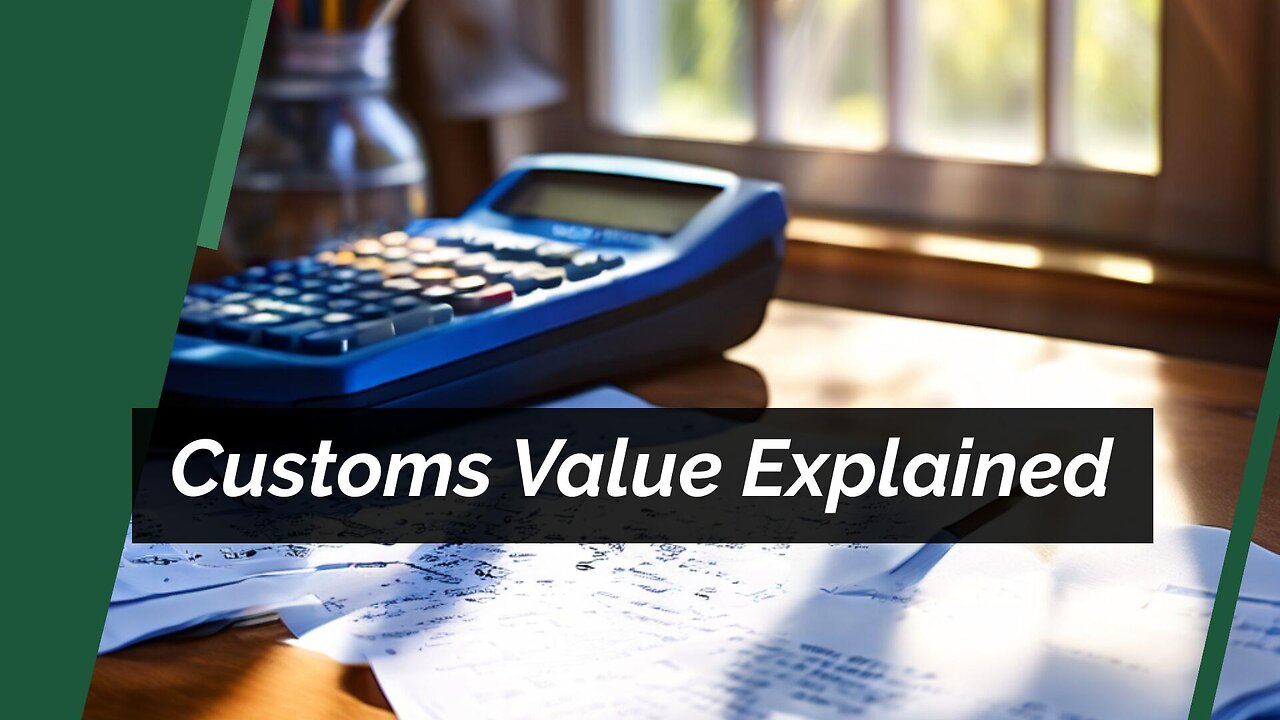Premium Only Content

Mastering Customs Value: Calculations, Implications and Documentation
ISF Template | 562-453-7357 | isf@isftemplate.com | www.isftemplate.com
Welcome back to our channel! In today's video, we will be discussing an important aspect of international trade - customs value. Customs value is the monetary worth of goods for the purpose of assessing customs duties and other charges. It serves as the basis for calculating the amount of duty and taxes that need to be paid. The most common method used to determine customs value is the transaction value method, which is based on the actual price paid or payable for the goods when sold for export to the country of importation. Other factors such as packing costs, commissions, royalties, and license fees can also be included in the customs value calculation if they are directly related to the imported goods.
When determining the customs value is not possible using the transaction value method, customs authorities may resort to alternative methods such as the deductive value method, computed value method, or the fallback method. Each method has its own set of rules and criteria for calculating the customs value. It is important to note that customs value is not limited to the purchase price of the goods; it also includes additional charges incurred during transportation, such as freight, insurance, and other costs necessary to bring the goods to the point of entry into the country.
Accurate customs value declaration is crucial for importers and exporters as it determines the amount of duties and taxes that will be levied on the goods. Incorrectly declaring the customs value can lead to penalties, delays in customs clearance, and even legal issues. For this reason, it is essential to ensure that the customs value declared is accurate and compliant with customs regulations. Many countries require importers to submit supporting documentation, including commercial invoices, bills of lading, packing lists, contracts, and purchase orders, to facilitate the customs value declaration process. It is important for importers to maintain proper documentation and be able to provide it to customs authorities upon request.
In conclusion, understanding customs value and its calculation is crucial for anyone involved in international trade. Accurately determining and declaring customs value ensures compliance with customs regulations, avoids costly penalties and delays, and facilitates smooth customs clearance. Stay tuned for more insightful content on customs brokerage, customs bonds, and international trade on our channel. Thank you for watching, and we look forward to seeing you in our upcoming videos!
#usimportbond #isfcustomsbroker #uscustomsclearing #isfentry
Video Disclaimer Here: This video is designed for education and is unaffiliated with US government bodies.
00:25 Customs value is the monetary worth of goods for assessing customs duties and charges in international trade.
00:44 The most common method to calculate customs value is the transaction value method, based on the actual price paid for the goods.
1:38 Additional charges like freight, insurance, and other costs are included in customs value, known as costs, insurance, and freight (CIF).
2:04 Accurate customs value declaration is crucial to avoid penalties, delays, and legal issues, with importers required to submit supporting documentation.
-
 1:37:05
1:37:05
AlaskanBallistics
10 hours ago $2.57 earnedI Love This Gun PodCast #16
39.3K3 -
 2:59:26
2:59:26
Twins Pod
19 hours agoEMERGENCY PODCAST WITH ANDREW TATE! - Twins Pod - Special Episode - Andrew Tate
186K199 -
 2:52:01
2:52:01
Jewels Jones Live ®
2 days agoTRUMP SECURES BORDER | A Political Rendezvous - Ep. 113
98.4K37 -
 25:02
25:02
marcushouse
1 day ago $46.87 earnedStarship Just Exploded 💥 What Went Wrong This Time?!
192K131 -
 12:00
12:00
Silver Dragons
1 day agoBullion Dealer Reveals Best Silver to Buy With $1,000
122K12 -
 12:58
12:58
NinjaGamblers
22 hours ago $16.22 earnedIs This The BEST Way to Win At Roulette? 😲
157K13 -
 1:01:54
1:01:54
CharLee Simons Presents Do Not Talk
3 days agoCALIFORNIA'S DONE!
107K43 -
 7:33
7:33
MudandMunitions
1 day agoUnboxing My FIRST Revolver! Smith & Wesson 442 .38 Special and What’s Coming Next for the Channel
133K16 -
 1:01:05
1:01:05
Trumpet Daily
1 day ago $14.55 earnedGermany Started Two World Wars and Now Wants Nuclear Weapons - Trumpet Daily | Mar. 7, 2025
106K92 -
 57:07
57:07
Stephen Gardner
1 day ago🚨BREAKING: Musk STUNS even Trump with LATEST FRAUD DISCOVERY!!
233K547